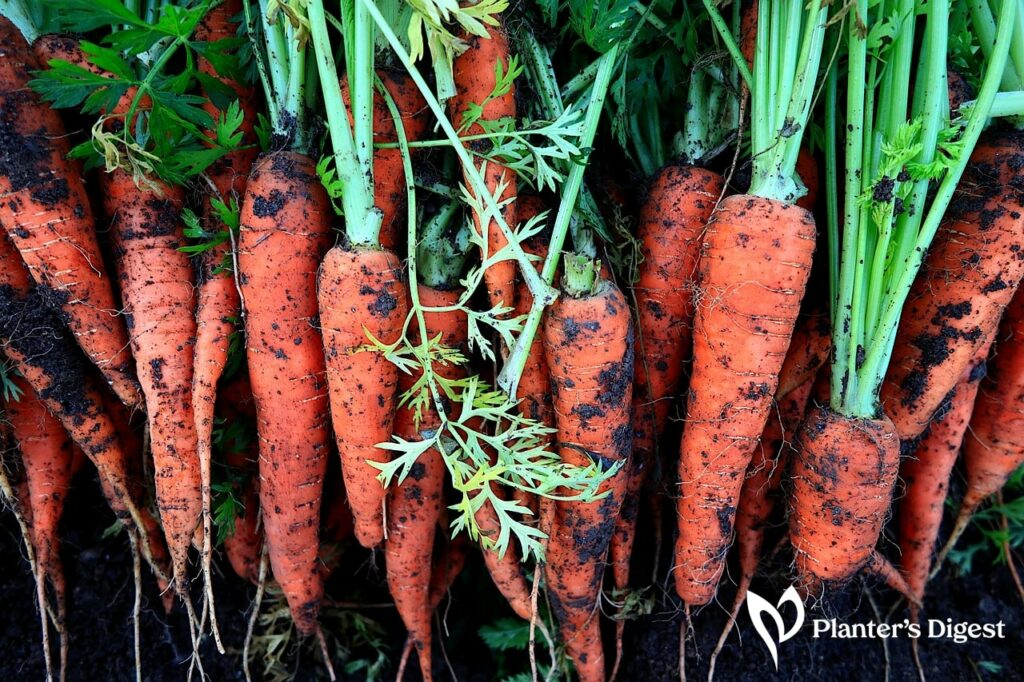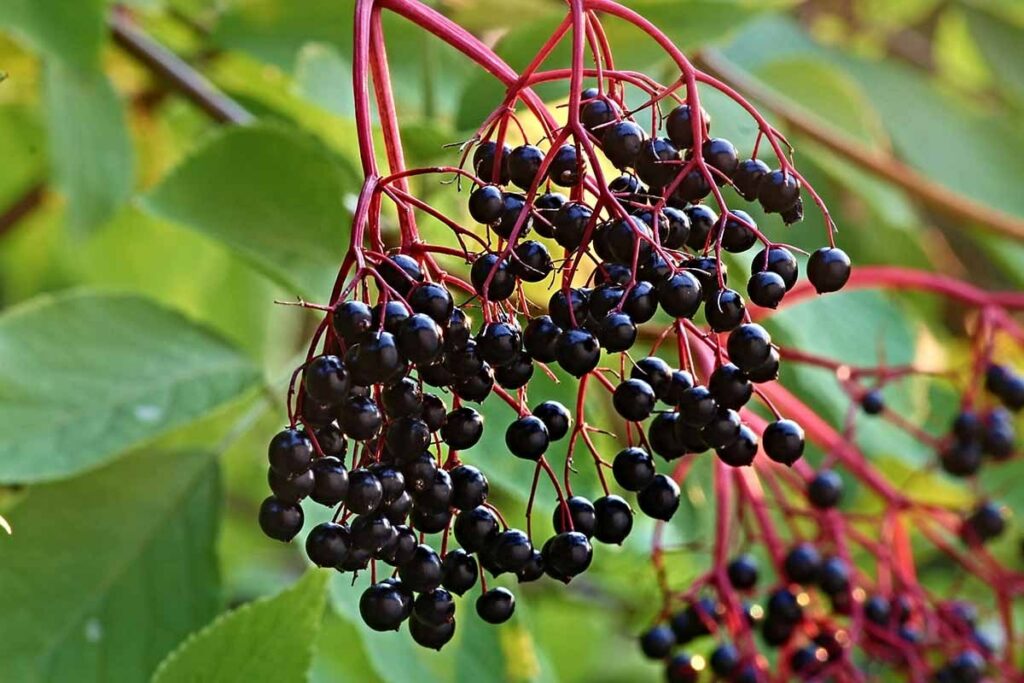Rabbits are not the only ones who love carrots. Humans also can’t get enough of them because they’re good for vision, immunity and overall health.
The good news is that you can get an unlimited supply of carrots by planting them in your backyard, and it starts with germinating those carrot seeds. Here’s how you can successfully do so!
How long do carrots take to germinate?
Carrot seeds take 7 to 14 days to germinate in ideal conditions, which depend on the quality of the seeds, soil temperature, air circulation and humidity.
Carrots are a cool-season crop, so it’s best to plant your seeds in the early spring or fall when soil temperatures are the ideal rate. Carrot seeds require soil temperature between 65 to 85 degrees Fahrenheit (18 to 29 degrees Celsius).
The soil must also be moist and not soggy for proper aeration. Suppose you cover your carrot seeds with a slightly thicker layer, about one-fourth or half-inch. In that case, the soil will stay moist longer and less likely to shift or get blown or washed away.
Carrot seeds will also germinate faster if you soak them in water 24 hours before planting them to soften the outer shell, let the water in, and speed up the sprouting process.
Once the seeds germinate, thinning out each seedling is an excellent practice, so there will be two to three inches of space between carrots to grow. You’ll be harvesting carrots in 10 to 12 weeks from planting with proper care and in optimal conditions.
What temperature do carrot seeds need to germinate?
Carrot seeds will germinate when the soil temperature is 65 to 85 degrees Fahrenheit (18 to 29 degrees Celsius).
Suppose the soil temperatures are lower than 40 degrees Fahrenheit (4 degrees Celsius). In that case, the carrot seed will take longer, up to 51 days, or not germinate.
On the other hand, if the soil temperature is between 68 and 95 degrees Fahrenheit (20 to 35 degrees Celsius), then the carrot seeds can germinate in 6 to 10 days.
Check the table below for the soil temperature ranges for germinating carrot seeds.
| Range | Temperature in Fahrenheit | Temperature in Celsius |
| Min | 40 | 4 |
| Ideal | 65 to 85 | 18 to 29 |
| Max | 95 | 34 |
Why do carrot seeds take so long to germinate?
Carrot seeds take a long time to germinate because their ultra-hard seed coats protect them from external damage and harsh conditions. Only when water penetrates the seed coat does it trigger plant cell duplication.
Carrots have hard outer seed coats to help the seed protect itself from pests and diseases. These seeds must first be softened before the seed can germinate; that’s why seeds are often soaked in water 24 hours before planting to speed up this process.
How do you make carrot seeds germinate faster?
Carrot seeds germinate faster when you soak them in water and plant them in warm, moist, well-aerated soil. Planting new carrot seeds and maintaining the proper humidity level around them will also speed up the germination process.
Let’s talk about each way to make carrot seeds germinate faster and how you can apply them in your gardening journey.
1. Soak the carrot seeds.
Carrot seeds have an ultra-hard seed coat, which helps protect them from fungal or bacterial diseases but makes it hard for the seedling to sprout.
Soaking carrot seeds is also called priming, which allows the ultra-hard seed coat to stay well-hydrated and leads to faster germination. To be effective, carrot seeds need precisely 24 hours before planting to germinate faster.
However, do not leave them in a jar of water for more than 24 hours because they’ll rot. We also recommend using cold water to prime your carrot seeds and prevent causing undue damage to them.
After soaking them for 24 hours, plant your carrot seeds directly into the soil and don’t let them dry out so you can enjoy the benefit of a faster germination process.
It’s best to plant them two to three weeks before your area’s last spring frost date. This will give it enough time to establish itself before that harsh winter.
2. Plant the carrot seeds in warm soil.
Carrot seeds will germinate successfully when the soil temperature is 65 to 85 degrees Fahrenheit (18 to 29 degrees Celsius). If the soil gets too cold, the seeds will not germinate, but they will die if it’s too hot.
You can help keep the soil warm for your carrot seeds by covering the soil with plastic or a cloche. After that, you can sit back and watch the warm sun rays heat up the air and soil underneath your cover.
Covering the soil also serves a dual purpose since it will protect your carrot seedling from harsh winds, pests, extreme cold and other external dangers in the garden.
Just don’t forget to remove the cover from time to time. Let the air vent prevent frying your seeds and cool things down under the cover or cloche.
3. Keep the soil moist.
Carrot seeds need moist soil to germinate because if the soil is too dry, there won’t be enough water to kickstart the germination process.
The goal is to keep the soil moist but not soggy, so after planting them, make sure to water the seeds regularly and deeply until they reach their roots. This will give the seeds the water they need to germinate.
You can also add mulch around the plants to help retain moisture in the soil. Just don’t overwater the seeds because it will cause damage and rot.
4. Maintain the right humidity level around carrot seeds.
Carrot seeds need moisture to germinate, and they get this from the amount of water vapor in the air or humidity. The ideal humidity level for carrot seed germination is between 70 to 80%.
The seeds will dry out before sprouting if the humidity level is too low. On the other hand, if it’s too humid, then the seeds are prone to rotting.
Humidity levels rise after watering the soil or heavy rain. Unfortunately, high humidity can lead to damping off, preventing the seedlings from germinating.
The best way to maintain the proper humidity level for your carrot seeds is to cover them with a humidity dome. This plastic or humidity dome will trap moisture in the air, giving the seeds the ideal humid environment and moist soil for germination.
5. Keep the soil aerated.
When the soil is aerated, the carrot seeds get the oxygen they need and will germinate faster. As the seedling develops, it converts oxygen and other stored carbohydrates into energy to thrive.
Unfortunately, if the soil is too wet, then there won’t be enough oxygen in the soil, and your carrot seeds may die before they even get the chance to germinate.
To keep the soil well-aerated, we recommend that you till the soil before planting. This will avoid soil compaction, break up the soil and let air flow through.
You could also use a garden fork to push holes around the soil every few weeks to break the soil and incorporate more air for your carrot seeds.
6. Use new carrot seeds.
New carrot seeds or those three years old and below are more likely to germinate than old ones. This is because more enzymes are needed to germinate and produce healthy seedlings.
On the other hand, as the carrot seed goes beyond three years, its germination rate decreases rapidly. It becomes more susceptible to pests and diseases.
So, to ensure a higher germination rate, check the age of your carrot seeds on the expiration date of the seed packet and always store them in a cool, dry place and sealed container.
Why won’t carrot seeds germinate?
Carrot seeds may fail to germinate because of poor soil quality, lack of water, wrong planting depth, birds and other wildlife, or the damping off disease.
Learn how these factors prevent your carrot seed from germinating fast.
1. Poor Soil Quality
Carrot seeds need high-quality, well-drained soil to germinate. For the best results, we recommend planting them in raised beds.
The ideal soil mix is equal parts compost, potting soil, perlite, and peat moss. With this soil mixture, the pH level should be in the ideal 6.0 to 6.8 range.
When dealing with carrot seeds, keep the soil loose; otherwise, the seeds will not get the air and moisture needed to sprout. So, if your soil is compact or heavy, you can amend your garden bed with sifted finished compost to loosen the soil.
Soil surfaces also become compact because of the sun and rain. As a result, the soil forms a hard shell that sheds water instead of absorbing it.
This crusting of the soil then prevents moisture from reaching your carrot seeds, and even if water does get your seed, it will prevent the sprouts from breaking through the crusty soil surface.
To prevent crusty soil, you can sow radishes together with carrots. Since radishes sprout first, they will help break the soil as they grow and prepare it for your carrot plant’s development.
You can also scratch the soil lightly, water it and add a layer of sand or vermiculite to prevent it from crusting and hardening.
2. Lack of Water
Without water, carrot seeds will not germinate. Most need damp soil to sprout and their shallow roots to withstand the heat and not die from dehydration.
Before sowing the seeds, water the bed deeply. After planting your carrot seeds, water with a fine mist twice daily until their shallow roots get enough water.
When the carrot seedling has developed several true leaves, you can reduce watering to once a week. Make sure that your carrots have at least 1 inch (2.5 cm) of water per week, and put straw mulch on top of the soil to retain moisture.
3. Wrong Planting Depth
Carrot seeds must sit near the soil surface to successfully sprout. So, if you plant your carrot seeds too deep, it will prevent them from popping out the soil’s surface and getting the air, moisture and sunlight it needs to grow.
Remember that seeds have limited nutrients and energy, which they use for germination. If the seeds are planted too deep and struggle to reach the surface, they will most likely run out of nutrients and die before they emerge on the ground.
The best thing to do is to cover your carrot seeds with one-fourth to half an inch of soil when you plant them. Each seed should also be planted two to three inches apart to give your carrots enough room to grow.
5. Birds and Wildlife
Birds and other wildlife are dangerous to your carrot seeds and seedlings. They’re bound to dig in your garden soil to find food or insects to eat, but in the process, they can displace your carrot seeds and disrupt the germination process.
For example, birds buried seeds deeper than recommended in the soil, preventing the seedlings from climbing successfully to the surface.
So, to keep your carrot seeds in place, we recommend covering your bases with chicken wire or netting for protection from birds and other wildlife that may visit your garden.
6. Damping Off Disease
Damping off is a fungal disease that commonly affects carrot plants. Once affected by this pathogen, the carrot stems turn dark, wilt and die.
Carrot seeds and seedlings are most vulnerable to the damping of disease when grown in cool, moist soil during springtime.
The fungi attack the seed by producing toxins that prevent them from germinating. Should it survive to a seedling, the diseases will cause the plant to rot and die.
The best defense against the damping of disease is to grow your carrot seeds in a sunny spot and loose, well-drained soil. Always clean your gardening tools after using them from one plant to another to prevent the transfer of these damaging pathogens.
When should you plant carrot seeds?
The best time to plant carrot seeds is during early spring and fall because the soil temperatures are ideal for germination.
If you’re living in a warm climate area, carrot seeds should be planted in the fall when temperatures are between 60 to 75 degrees Fahrenheit.
On the other hand, if you’re living in a cool climate area, carrot seeds should be planted in the spring, preferably after the last frost when the soil temperature is between 70 and 75 degrees Fahrenheit.
How to Plant Carrot Seeds
Now that you know how to successfully germinate carrot seeds, let us guide you on how to plant them in your garden.
1. Weed your garden beds.
Planting carrots begins with preparing your garden beds and removing all the weeds by the root. Weeds compete with plants for nutrients, water and sunlight, so by removing them, your carrot plant will get all its essential needs to grow strong and healthy.
Weeds can also cause pest infestations and harbor diseases. Without them, you reduce your carrot plant’s risk of getting harmed by pests and diseases.
When harvest time comes, weeds can make it difficult to harvest your hard-earned carrots. So, make sure to regularly pull them out to create a clean and easy garden space.
2. Till the soil.
You should expect your carrots to grow deep into the ground and survive. You should keep your soil loose, well-drained and aerated so it gets all the water and nutrients it needs from the soil.
To loosen up your soil, you can use a broad fork, till the soil and remove any stick, rock or debris in your garden bed that might disrupt your carrot plant’s development.
3. Plant the carrot seeds.
| Difficulty | Easy ●○○○○ |
| Duration | 1 to 2 hours |
| Things You Need | Carrot seeds Garden fork Water Organic soil amendments |
How To Do
1. Choose a sunny spot for your carrot garden bed. Amend the soil with compost or manure to improve the drainage and fertility of the soil.
2 .Loosen the soil with a garden fork.
3. Make a shallow trench in the soil about one-fourth-inch deep.
4. Space the seeds about two to three inches apart in the trench.
5. Cover the seeds with compost and water well. Keep the soil moist with regular watering.
6. Thin out the seedlings so each plant has enough room to grow.
4. Cover the seeds with compost.
Covering carrot seeds with compost is an important task after planting because it helps retain moisture in the soil, which the seeds need to germinate.
Compost also provides nutrients to the seedlings to aid their health and development. It also helps suppress weed growth and protects the seeds from pests and diseases, increasing the success rate of germination.
Can you germinate carrot seeds in a paper towel?
You can germinate carrot seeds using a paper towel since it can retain the moisture needed for germination. However, they should be planted directly into the soil since carrot plants can be easily damaged when transplanted.
Here are the steps to germinate carrot seeds using a paper towel.
| Difficulty | Easy ●○○○○ |
| Duration | 30 minutes for preparation7 to 14 days for germination |
| Things You Need | Carrot seeds Paper towels Water A plastic bag or container |
How To Do
1. Place a damp paper towel on a flat surface.
2. Space the carrot seeds evenly on the paper towel, about half an inch apart.
3. Cover the seeds with another damp paper towel.
4. Place the paper towels in a plastic bag or container.
5. Seal the bag or container and place it in a warm, dark location.
6. Check the seeds daily and add more water to the paper towels as needed.
7. The seeds should germinate within 7 to 14 days.
8. Plant the seeds directly on a garden bed once they have germinated.
How to Keep Carrot Plants Healthy
After germinating and planting your carrot seedlings, here are more tips on how to keep your carrot plants healthy.
1. Regular Watering
Carrots need plenty of moisture to grow, soak the soil at less frequent intervals when watering them. Otherwise, your carrots may become bitter without enough water.
You should also water your carrot plants more often during hot and dry weather or if your garden has dry soil.
Another way to prevent having dry soil and less moisture for your carrot plants is to use sandy, loose, and well-draining together with plenty of organic material.
This type of soil is ideal for the roots, which is what we eat in carrot plants, so they grow long and straight without rocks, roots, or soil clumps getting in the way.
2. Using the Right Fertilizer
You can start feeding your carrot plant with a liquid fertilizer once it develops its first true leaves. Remember, the ideal soil pH for carrots is between 6.0 and 7.0 (slightly acidic to neutral).
You can amend your soil and improve its nutrient content and structure by adding compost in spring or fall. But before adding any fertilizer, always conduct a soil test to ensure your soil’s actual needs because over-fertilizing your plants can burn them.
The safest way is to use a balanced fertilizer, such as 10-10-10, to provide equal parts of nitrogen, potassium and phosphorus for your plant. Make sure to avoid fertilizers with herbicides because they can kill weeds and desirable plants.
3. Thinning the Seedlings
Thinning is a gardening technique recommended for carrot seedlings. This process involves removing some seedlings from a row so others will have enough room to grow.
Thinning carrots is important because carrot plants need a lot of space to grow their long, straight, edible roots. If they’re planted too close, they’ll just end up competing with water, nutrients and sunlight, leading to small, crooked carrot yield.
To thin carrot seedlings, just pull out the weakest or smallest seedling from a row so that there will be about two to three inches of space between each plant. It’s best to thin your carrots once the seedlings are two to three inches tall.
FAQs on How Long Does It Take for Carrots to Germinate
Carrot seedlings have two small round leaves attached to a thin green stem. Later on, it will develop feathery, true leaves that resemble the leaves of a mature carrot plant.
Plant two to three carrot seeds per hole to increase the chances of germination. Carrot seeds have ultra-hard seed coats, making them difficult to germinate.
Carrot seeds do not need light to germinate because light inhibits the production of gibberellic acid, a hormone essential for germination.
After two weeks of germination, we thin carrots to give every strong carrot seedling so it can develop its long, straight roots. If planted together, they will compete with nutrients and grow small carrots.





